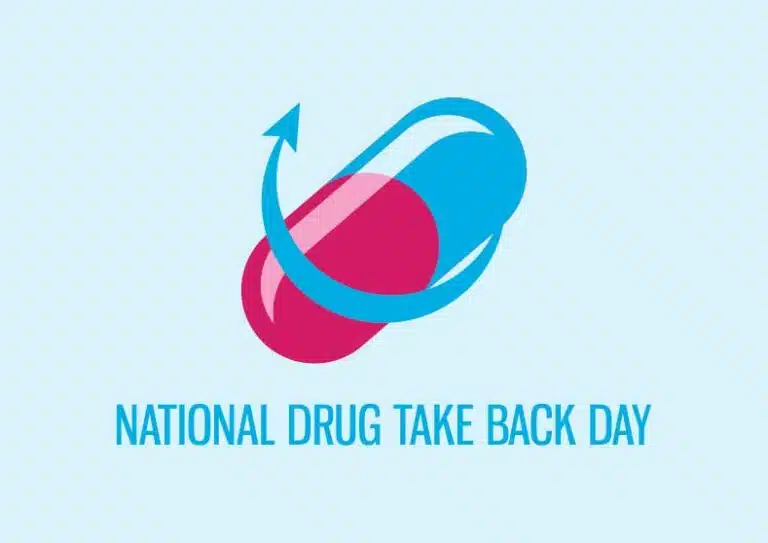National Drug Take Back Day 2023
- What Is National Prescription Drug Take Back Day?
- How To Dispose Of Drugs
- Other Options For Prescription Drug Disposal
- Preventing Prescription Drug Misuse

Many people leave expired or unneeded medications in their medicine cabinets. These substances can cause serious health problems, including drug overdose, if they fall into the wrong hands. That’s why it’s important to dispose of your unused prescription drugs.
To help you do so, the Drug Enforcement Administration (DEA) created National Prescription Drug Take Back Day.
What Is National Prescription Drug Take Back Day?
On National Prescription Drug Take Back Day, Americans can bring their unwanted medications to collection sites staffed by law enforcement and other authorized collectors. This year, it takes place on Saturday, April 22nd, from 10 am to 2 pm.
By facilitating safe drug disposal, the event helps reduce prescription drug misuse. Prescription drug misuse occurs when someone uses a prescription medication in a manner not prescribed.
For example, a small child may stumble upon a parent’s pills and swallow them. Similarly, teens and adults might steal a friend’s prescription opioids or stimulants to get high. All forms of prescription drug misuse can lead to overdose, addiction, and other health issues.
When you dispose of unneeded medications through drug take-back events, you help reduce prescription drug misuse and increase public safety.
How To Dispose Of Drugs On National Prescription Drug Take Back Day
To find a collection site in your area, use the DEA’s online locator. When you arrive, simply place your medications in one of the drop boxes. You may drop off a variety of medications, including pet medications. Most collection sites accept the following types of drugs:
- capsules
- creams
- inhalers
- non-aerosol sprays
- ointments
- patches
- pills
- vials
All liquids must be in their original containers.
In addition, vape pens and e-cigarette devices must not contain batteries. If the batteries are not removable, the collection site won’t accept the devices. Other prohibited items include:
- aerosol cans
- household hazard waste (such as gas, oil, and pesticides)
- illegal drugs
- items with blood or other bodily fluids
- medications that contain iodine
- mercury thermometers
- personal care products (such as soap, lotion, and sunscreen)
- sharps/syringes
Also, if your medications are controlled substances (such as prescription opioids), you may only drop them off if you legally obtained them for your own use or for the use of a household member or pet.
Other Options For Prescription Drug Disposal
Even if you miss National Prescription Drug Take Back Day, you can still dispose of your medications safely. Many pharmacies, hospitals, and law enforcement facilities operate drug collection sites all year long. To find one in your area, use this DEA directory.
If you can’t find a drop-off location in your area, check the label on your medication. It might have specific disposal instructions.
If not, the DEA recommends that you remove the medication from its container. Place the container in the recycling bin or trash after scratching out any personal information (such as your name and address).
Next, mix the medication with cat litter, used coffee grounds, or another undesirable substance. Finally, put the mixture in a sealable container, and place it in the trash.
Can You Flush Medications?
Some people can’t access the materials needed to dispose of drugs in this way. In that case, you might be able to flush the medication down the sink or toilet.
However, you must check the drug’s label or patient information sheet to ensure it’s safe to do so. Also, check your local laws. Some communities prohibit the flushing of medications because they may contaminate the water supply.
Preventing Prescription Drug Misuse
Along with safely disposing of medications, you can help prevent prescription drug misuse by:
- storing all medications in locked containers away from children
- keeping a log of all the medications in your home so you’ll know if any pills go missing
- never sharing your medications with other people
- never taking your medications in front of small children
If you think someone you love is misusing prescription drugs, seek help at a substance abuse treatment program. These inpatient and outpatient programs provide a variety of evidence-based treatments, including:
- medical detox, in which doctors help you safely get drugs out of your system
- behavioral therapy, in which a therapist helps you manage drug cravings and any mental health concerns that may have led you to misuse prescription drugs in the first place
- support groups, in which you can discuss your experiences and coping strategies with other people in recovery
To learn more about treatment options, please reach out to an Ark Behavioral Health specialist. Our board-certified healthcare providers offer personalized, comprehensive care to help you or your loved one thrive.
Written by Ark Behavioral Health Editorial Team
©2024 Ark National Holdings, LLC. | All Rights Reserved.
This page does not provide medical advice.
Drug Enforcement Administration - HOW TO PROPERLY DISPOSE OF YOUR UNUSED MEDICINES
Drug Enforcement Administration - Take Back Day
Food and Drug Administration - Drug Disposal: Drug Take Back Locationst
South Carolina Department of Health and Environmental Control - DEA National Drug Take Back Day

Questions About Treatment?
Ark Behavioral Health offers 100% confidential substance abuse assessment and treatment placement tailored to your individual needs. Achieve long-term recovery.
100% confidential. We respect your privacy.
Prefer Texting?
Our friendly support team is here to chat 24/7. Opt out any time.







 Learn More
Learn More








